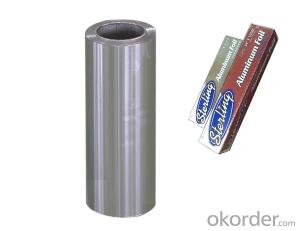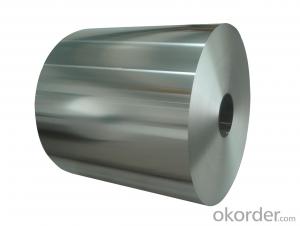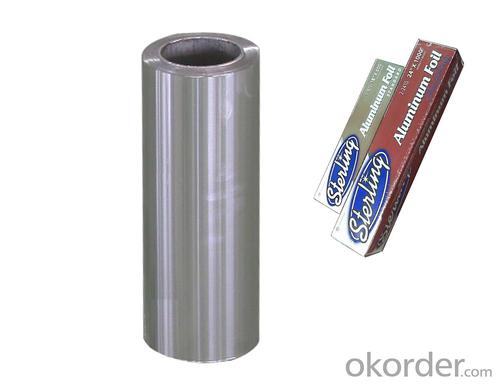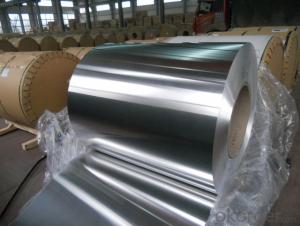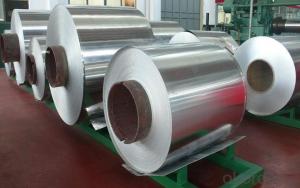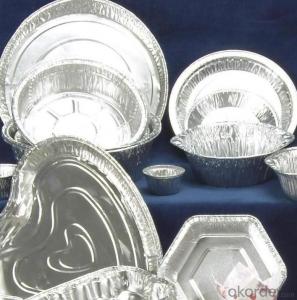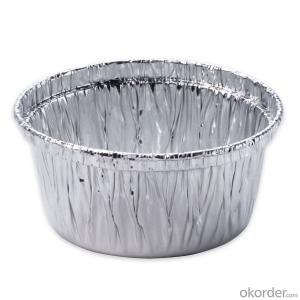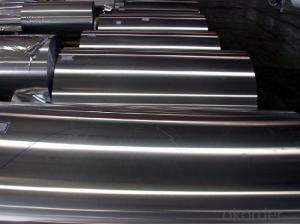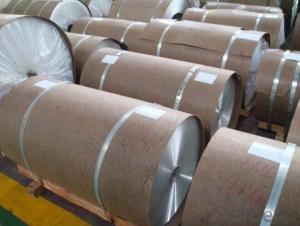Decorative Aluminum Sheets Canada - Household Aluminium Foil FDA Certificate
- Loading Port:
- Shanghai
- Payment Terms:
- TT or LC
- Min Order Qty:
- 1 m.t
- Supply Capability:
- 5000 m.t/month
OKorder Service Pledge
OKorder Financial Service
You Might Also Like
Aluminium Foil are used for Cooking, Storing, Freezing,and wrapping.
Household Aluminium Foil Roll specification:
Material: Aluminium Foil Alloy: 8011 "O"
Thickness: 9micron-24micron is available for different purpose.
Length: 5M--300M As per customer requirement for Houseuse or Foodservice,Catering Use.
Width:250mm--600mm, Regular width: 300mm/450mm as per customer requirement.
Packing: colour box / dispenser box/ Printed PP Sleeve,Bag / Shrink wrap with Printed paper/ Plastic Bubble bag as per customer requirement.
| Description | Household Aluminum Foil |
| Material | Aluminium alloy |
| Shape | Roll |
| Alloy | 8011-O 8006 |
| Length | 3m~300m |
| Usage | Food, ketchen packing storing freezing ,etc |
| Core ID | 28mm 32mm 35mm 38mm |
| Thickness | 9mic-22mic |
| Width | 200mm-600mm |
| Package | Colour box / dispenser box/ Printed PP Sleeve,Bag / Shrink wrap with Printed paper/ Plastic Bubble bag as per customer requirement. |
| delivery time | 25days-28days |
| payment | T/T,L/C |
| quality tolerance | ±3% |
| cerfificate | ISO9001:2000,FDA,SUV,NQA,SGS |
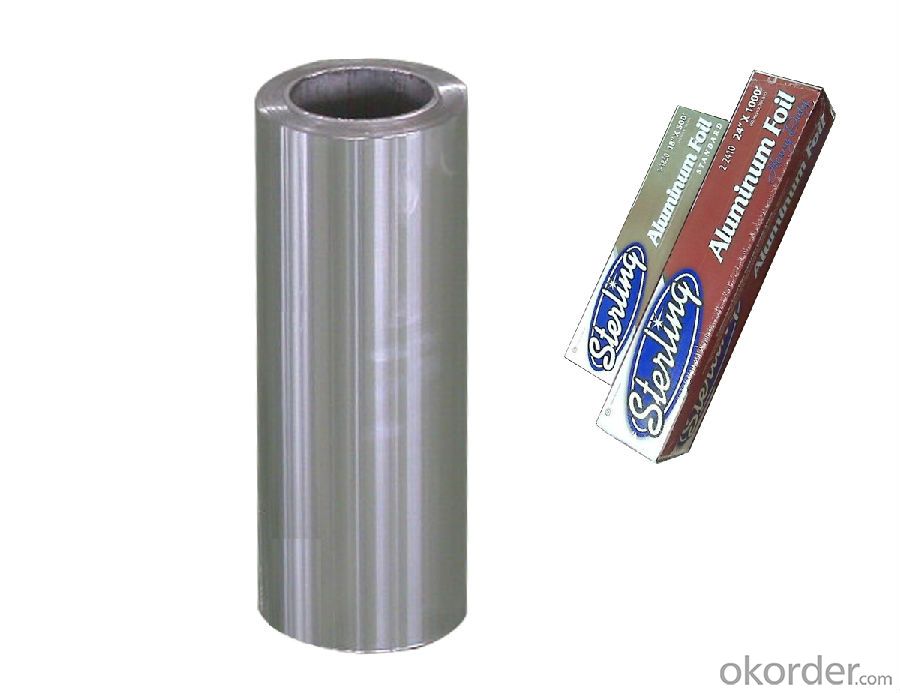
- Q: This question seeks to understand the specific characteristics of aluminum sheets that make them suitable for various applications.
- <p>Aluminum sheets possess several properties that make them versatile for different applications: 1. Corrosion resistance: Aluminum forms a protective oxide layer, which makes it resistant to corrosion. 2. Lightweight: Aluminum is lighter than many other metals, which is beneficial for applications where weight is a concern. 3. High strength-to-weight ratio: Despite being lightweight, aluminum is strong and durable. 4. Good thermal and electrical conductivity: Aluminum conducts heat and electricity well, making it ideal for heat sinks and electrical components. 5. Formability: Aluminum can be easily shaped and bent, which is useful in construction and manufacturing. 6. Recyclability: Aluminum is highly recyclable, reducing waste and environmental impact. 7. Reflectivity: Aluminum reflects light and heat, which is useful in applications like solar reflectors and insulation. These properties vary in importance depending on the specific application, such as construction, automotive, aerospace, or consumer goods.</p>
- Q: What are the different surface treatments available for aluminum sheet?
- There are several different surface treatments available for aluminum sheet, each with its own advantages and purposes. Some of the most common surface treatments for aluminum sheet include anodizing, painting, powder coating, and polishing. Anodizing is an electrochemical process that creates a protective oxide layer on the surface of the aluminum sheet. This treatment not only enhances the corrosion resistance of the metal but also provides an attractive finish. Anodized aluminum can be dyed in various colors, making it a popular choice for architectural and decorative applications. Painting is another popular surface treatment for aluminum sheet. It involves applying a liquid paint coating to the surface, which can provide both protection and aesthetic appeal. Painted aluminum sheets are commonly used in building facades, automotive parts, and other applications where a vibrant and durable finish is desired. Powder coating is a dry finishing process that involves electrostatically applying a powder coating to the aluminum sheet and then curing it under heat. This treatment offers excellent corrosion resistance, durability, and a wide range of color options. Powder-coated aluminum sheets are often used in outdoor furniture, commercial signage, and architectural applications. Polishing is a mechanical surface treatment that involves grinding or buffing the aluminum sheet to create a smooth and shiny finish. This treatment is commonly used for decorative purposes, such as in jewelry, automotive trim, and high-end appliances. It is important to select the appropriate surface treatment for aluminum sheet based on the intended application and desired appearance. Each treatment has its own unique properties and characteristics, so it is always recommended to consult with experts or professionals in the field to determine the best surface treatment for specific requirements.
- Q: Aluminum is put into copper chloride and how can you tell what happens to them visually?
- Aluminum will reduce copper ions (and be oxidized) when chloride ions are present. Otherwise aluminum metal will pretty much just sit there. The reason is the passivating layer of Al2O3 on the surface of any piece of aluminum. This metal oxide layer prevents the metal from actually reacting. But in the presence of chloride ion in water, Al2O3 will react, resulting in AlCl4^- and OH- ions. Al2O3(s) + 8Cl- + 3H2O(l) -- 2AlCl4^- + 6OH- This allows the aluminum metal to come into contact with copper ions resulting in the redox reaction: 2Al(s) + 3Cu2+ -- 2Al^3+ + 3Cu(s) There is a side reaction where aluminum metal reacts with water, and hydrogen gas is produced. 2Al(s) + 2H2O --2 AlOH^2+ + H2(g) When you actually observe the reaction, you will see copper metal being formed, aluminum metal dissolve and bubbles of hydrogen gas being given off. ============ Follow up ============= Because of the passivating effect of Al2O3 and the fact that Al2O3 dissolves in the presence of Cl- forming a new complex ion, AlCl4^-, Brian's answer leaves out a lot of the important chemistry.
- Q: Can aluminum sheet be used for heat sinks?
- Yes, aluminum sheet can be used for heat sinks. Aluminum is a common material used for heat sinks due to its excellent thermal conductivity properties. It is lightweight, affordable, and has good corrosion resistance. Aluminum sheet can be easily fabricated into various shapes and sizes, making it suitable for different heat sink designs. The flat and thin nature of aluminum sheet allows for efficient heat dissipation by increasing the surface area available for heat transfer. Additionally, aluminum can be easily machined or extruded to create fins, which further enhance the heat dissipation capability of the heat sink. Overall, aluminum sheet is a popular choice for heat sinks in various applications, including electronics, computers, LED lights, and automotive components.
- Q: Is it possible to use aluminum sheets as a material for the exterior walls of a building?
- <p>Yes, aluminum sheets can be used for exterior siding. They are known for their durability, resistance to corrosion, and low maintenance requirements. Aluminum siding is lightweight, easy to install, and can be painted to match various architectural styles. It is also resistant to harsh weather conditions and pests, making it a popular choice for many homeowners and builders. However, it is important to ensure proper installation to maximize its benefits and longevity.</p>
- Q: 3003H24 alloy aluminum plate refers to what kind of aluminum plate?
- Attached: O status: fully annealed to obtain the lowest strength of the processing products. 8 state: hard working state (9)To sum up: 3003 refers to the aluminum manganese alloy, H24 represents the process of rolling, through incomplete annealing to achieve the specified strength, hardness of an aluminum substrate. In addition to the 5 first series of aluminum magnesium alloy used in aluminum plate, the other 4 prefix silicon as the main alloying elements in zinc series, as the elements of the 7 prefix series.
- Q: Are aluminum sheets suitable for outdoor signage?
- Yes, aluminum sheets are highly suitable for outdoor signage. Aluminum is a durable and weather-resistant material that can withstand the harsh outdoor elements, including rain, wind, and sunlight. It is corrosion-resistant, which makes it ideal for long-term outdoor use. Additionally, aluminum sheets are lightweight, making them easy to handle and install. They can be easily cut, bent, or shaped to create various signage designs. Aluminum also offers a sleek and professional appearance, making it a popular choice for outdoor signage in commercial and industrial settings.
- Q: What is the fatigue life of aluminum sheets?
- The fatigue life of aluminum sheets refers to the number of cycles that the material can withstand before failure occurs under cyclic loading conditions. The fatigue life of aluminum sheets can vary depending on various factors such as the alloy composition, thickness, surface finish, loading conditions, and environmental factors. Aluminum is known for its relatively high fatigue strength compared to other materials, making it a popular choice in various industries including aerospace, automotive, and construction. The fatigue life of aluminum sheets is typically influenced by the presence of microstructural defects such as inclusions, voids, and grain boundaries. To determine the fatigue life of aluminum sheets, fatigue tests are conducted using standardized procedures such as ASTM E466 or ASTM E606. These tests involve subjecting the material to cyclic loading conditions, typically at a constant stress or strain amplitude, while monitoring the number of cycles required for failure to occur. The results are then used to generate an S-N curve, which represents the relationship between the applied stress or strain amplitude and the number of cycles to failure. The S-N curve provides valuable information about the fatigue life of aluminum sheets, indicating the stress or strain levels at which the material can withstand a certain number of cycles before failure. It is important to note that the fatigue life of aluminum sheets can be improved through various methods such as alloying, heat treatment, surface treatment, and proper design considerations. In conclusion, the fatigue life of aluminum sheets is a critical factor to consider when designing components or structures subjected to cyclic loading conditions. Understanding the specific properties and characteristics of the aluminum alloy, along with proper testing and analysis, can help determine the fatigue life and ensure the safe and reliable performance of aluminum sheets in various applications.
- Q: Can aluminum sheet be used for cookware?
- Yes, aluminum sheet can be used for cookware. Aluminum is a popular choice for cookware due to its excellent heat conductivity, which allows for even heat distribution and quick heating. It is lightweight, durable, and resistant to rust and corrosion. Additionally, aluminum cookware is affordable and relatively easy to clean. However, pure aluminum is a soft metal, so it is often combined with other materials, such as stainless steel or nonstick coatings, to enhance its durability and nonstick properties.
- Q: Can aluminum sheets be used in aerospace industries?
- Aluminum sheets find frequent usage in aerospace industries. Lightweight and resistant to corrosion, aluminum proves to be an exceptional material with a remarkable strength-to-weight ratio, making it well-suited for diverse aerospace applications. Its capability to withstand elevated stress and pressure renders it valuable in the construction of aircraft structures, including wings, fuselage, and landing gear. Moreover, aluminum sheets possess malleability, allowing for the creation of intricate shapes that contribute to the requisite design flexibility within the aerospace sector. However, it is worth noting that aluminum alloys, rather than pure aluminum, are typically employed in aerospace applications due to their augmented mechanical properties and superior performance.
Send your message to us
Decorative Aluminum Sheets Canada - Household Aluminium Foil FDA Certificate
- Loading Port:
- Shanghai
- Payment Terms:
- TT or LC
- Min Order Qty:
- 1 m.t
- Supply Capability:
- 5000 m.t/month
OKorder Service Pledge
OKorder Financial Service
Similar products
Hot products
Hot Searches
Related keywords
